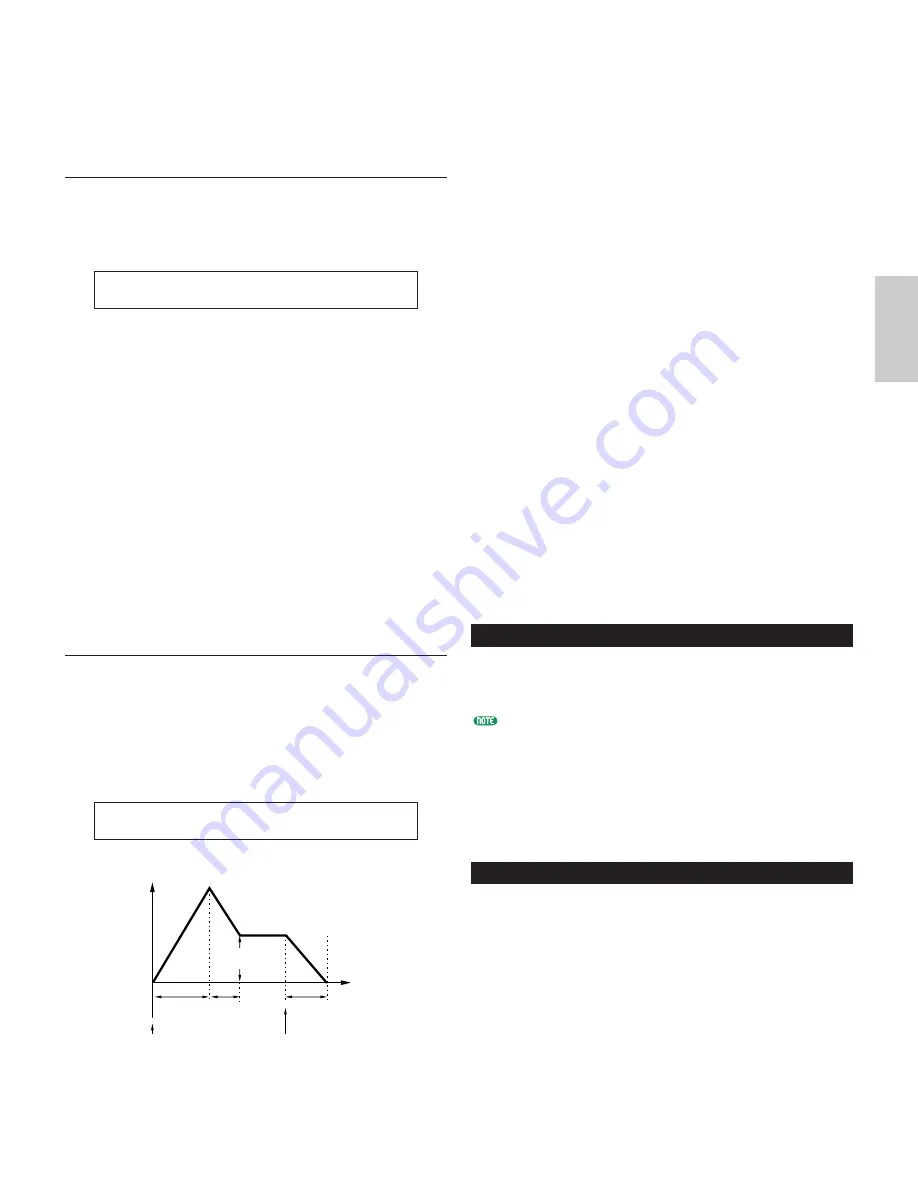
125
Pe
rf
or
m
an
ce
M
od
e
■
Time
Set the pitch transition time. Higher values mean
longer transition times. You can also set this using
the PORTAMENTO knob on the front panel of the
CS6x.
❏
Settings:
-64 ~ 0 ~ +63
QED Filter (Quick Edit Filter)
These parameters control filters which govern the tonal
quality of the Voice. If you are using LPF (Low Pass Filter)
and HPF (High Pass Filter) combined together, the
parameters in the QED Filter screen only affects LPF.
■
Cutoff
Raise or lower the Cutoff frequency for each Voice of
a Layer Part. You can also adjust this parameter
using the [CUTOFF] knob on the front panel of the
CS6x.
❏
Settings:
-64 ~ 0 ~ +63
■
Reso (Resonance)
Set the amount of Resonance (harmonic emphasis)
applied to the signal at the Cutoff frequency. You
can also adjust this parameter using the
[RESONANCE] knob on the front panel of the
CS6x.
❏
Settings:
-64 ~ 0 ~ +63
QED EG (Quick Edit Envelope Generator)
The EG (Envelope Generator) controls the transition in
output level over time for each Voice in a Layer Part.
There are four parameters governing the transition in
output level from the moment a note is pressed on the
keyboard to the moment it is released or the point at
which the output level has faded to zero. These Layer
Part settings make use the each of the Part Edit settings.
Key on
Key off
Attack
Time
Release
Time
Decay
Time
Time
Level
Sustain
Level
QEDíEG) Attack Decay Sustain Release
Common +63 +63 +63 +63
QEDíFilter) Cutoff Reso
Common +63 +63
■
Attack
Set the transition time from the moment a key on
the keyboard is pressed to the point at which the
output level of the Layer Part reaches its peak. You
can also adjust this parameter using the [ATTACK]
knob on the front panel of the CS6x.
❏
Settings:
-64 ~ 0 ~ +63
■
Decay
Set the transition time from the point at which the
output level of the Layer Part reaches its peak to the
point at which it levels off. You can also adjust this
parameter using the [DECAY] knob on the front
panel of the CS6x.
❏
Settings:
-64 ~ 0 ~ +63
■
Sustain
Set the output level of the Layer Part maintained
while the key on the keyboard is being held down.
You can also adjust this parameter using the
[SUSTAIN] knob on the front panel of the CS6x.
❏
Settings:
-64 ~ 0 ~ +63
■
Release
Set the transition time from the point at which the
key on the keyboard is released to the point at which
the output level of the Layer Part reaches zero. You
can also adjust this parameter using the [RELEASE]
knob on the front panel of the CS6x.
❏
Settings:
-64 ~ 0 ~ +63
Common Arpeggio
The following four screens govern the behavior of the
Arpeggiator. The parameters are the same as those
used in Voice Edit Mode. Details are given on Page 82.
To use the Arpeggiator in Performance Mode, the Arpeggio
and Layer Switches (Page 133) must be set to “on.”
ARP Type (Arpeggio Type)
ARP Limit (Arpeggio Note Limit)
ARP Mode (Arpeggio Mode)
ARP PlayEF (Arpeggio Play Effect)
Common Controller
You can assign MIDI Control Change Numbers to the
controls and front panel knobs. For example, Knob
[1]/[2] can be set to control the amount of effect
applied to a sound and the Foot Controller can be set to
control modulation. You can set different Control Set
assignments for each Performance.
The following two Control Set screens are available.
CTL Assign1 (Controller Assign 1)
CTL Assign2 (Controller Assign 2)
Summary of Contents for CS6X
Page 190: ...190 MEMO...
Page 191: ...191 MEMO...













































